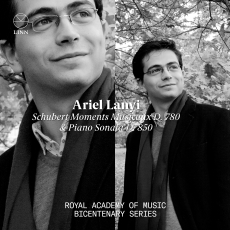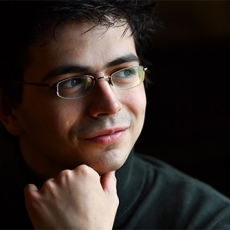Ariel Lanyi - Schubert - Fanfare
This debut recital is a kind of graduation prize for the young Israeli pianist Ariel Lanyi, who was born in Jerusalem in 1997. He recently graduated from the Royal Academy of Music in London, which underwrote the opportunity to record a CD for a handful of outstanding students. Lanyi’s Schubert was recorded at the Royal Academy at the end of 2020. This is the first of four award winners I’ve heard from the school’s Bicentenary Series, and I’m impressed.
Unlike some Russian prodigies who seem like finished artists almost from the outset, Lanyi sounds like a work in progress, which is perfectly natural from a 23-year-old. I think a special gift stands out, however, which is poetry. Lanyi plays the six Moments musicaux so intimately that he might be playing for himself while the listener eavesdrops. He pays particular attention to varying his touch, and he’s comfortable at softer dynamics where eager young pianists might give in to the urge to project the music over the footlights, for fear that they would otherwise lose the audience.
Schubert’s six miniature masterpieces date from 1823 onward and were published in his lifetime in 1828, but they were not intended as a unified cycle, and Schubert isn’t verified to have chosen the title of Moments musicaux. Two of the six had been published previously, No. 3 as “Air russe” and No. 6 as “Plainte d’un troubadour”—those titles are of dubious origin, too. In an online note at his website Lanyi writes, “I see the Moments musicaux as a series of snapshots of outdoor life, in its rawness, richness and variety. The sounds of bells, alpine horns, and dances mingle with uniquely Schubertian rhythms and textures.” I’ve never heard these pieces attached to visual imagery, but what is self-evident is that they capture varied aspects of Schubert’s keyboard style and do it exquisitely.
Lanyi is in tune with their variety, sounding suitably buoyant in No. 3, exuberantly energized in No. 5, and plaintive in No. 6. His phrase-shaping is sensitive, and there’s really no hindrance to praising the entire set. He doesn’t favor the clean, dry, precise style of Alfred Brendel, but on the other hand, the boldness and individuality of Lars Vogt on Ondine isn’t here either. A certain reticence makes me feel that Lanyi needs to come out of his shell a little more. He achieves that with his dramatic, assured playing in the opening moments of Piano Sonata, D 850. The whole movement is propulsive (minus some of Richter’s clangorous bluntness, which is fine with me), and the various sections are confidently structured.
This movement is a high point in the recital, projecting a rich, bell-like tone beautifully captured by Linn’s vivid recorded sound. The second-movement Andante con moto is approached with some awkwardness, however, and it becomes a bit disjointed from phrase to phrase, exhibiting some halting rubato. The lyrical second subject returns to better form. Lanyi decides to play the Scherzo on a brash, Beethovenian scale, which he can’t quite carry off with Richter’s impetuosity and speed. The finale has always had a tinkling music- box quality to me, and there’s not much anyone can do but go along, except Richter (I’m thinking of his live reading from Prague in June 1956), who injects a special note of joy and vibrancy. By comparison Lanyi is conventional and polite.
With so much good playing and such obvious musicality, this young pianist makes an auspicious debut. No one can predict the road ahead, but apparently Lanyi is already concertizing widely and he has been invited to the Marlboro Festival, always a good sign.

